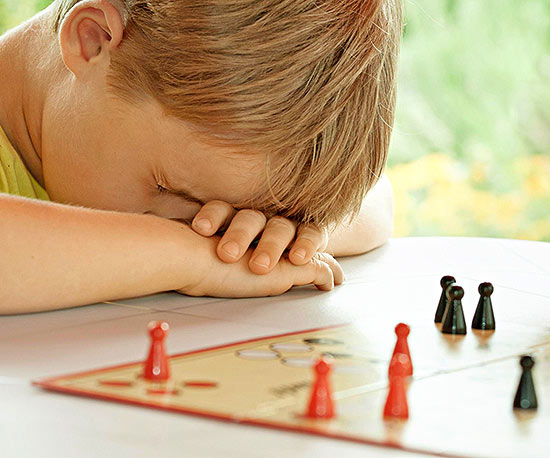
Whether your kid throws a fit when he doesn't win at Candy Land or has a meltdown if his sister beats him to the best seat on the couch, it's clear he really likes to come out on top.
While winning gives your child a sense of pride and control, there are still benefits that come with experiencing defeat. "Losing helps children begin to develop empathy and perseverance," says Carolyn levers-Landis, Ph.D., a clinical psychologist at UH Rainbow Babies & Children's Hospital, in Cleveland. Even if your kid seems heartbroken in the moment, he should get over his loss pretty quickly. "Instead of coddling him, it's okay to let him feel the pain of defeat," says Dr. Ievers-Landis. You can teach him to bounce back faster with these attitude-adjusting strategies.
\”I\’m never playing this dumb game again.\”
Winning Tactic: Explain that everybody loses sometimes
Of course, many of the board games geared toward this age group — which involve drawing a card or rolling dice — are simply a matter of luck. Explaining this to your child can help make her less angry, but you should avoid sugarcoating her loss altogether. Instead, try saying: "Things don't always work out the way we want. There are times when I feel disappointed too." This is different from saying, "No big deal," which doesn't acknowledge your child's feelings, explains Maureen O'Brien, Ph.D., author of Watch Me Grow: I'm One-Two-Three. Then, tell her that there will be other opportunities when she can win. This will bring her out of the present and give her something to look forward to.
If the outcome of a game relied on strategy rather than luck, you can help her improve by brainstorming what she could have done differently. Say something indirect like, "Hmm, I wonder what would've happened if you'd moved this chess piece instead." This way, your child won't feel you're being critical. Plus, she'll be more likely to remember a new strategy if she draws her own conclusions.
\”I give up!\”
Winning Tactic: Emphasize that it's important to finish games you start.
If your child gets a sense that he's not going to come out on top, he may want to bail so he can avoid the frustration (or humiliation) of a loss. However, you should encourage your child to stick it out to the end. "Tell him that quitting in the middle of a game is like breaking a promise to a friend — and that if he calls it quits, his friend may not want to play with him again," Dr. Ievers-Landis suggests. You might also remind him that football and baseball teams keep playing until the end of a game no matter what the score is or how disappointed the players are. This year's Super Bowl is a great real-life example. Then ask your child how he would feel if another player backed out on him and took away his chance to win the game. "Even young kids will tell you that they'd feel bad about it," says Dr. Ievers-Landis.
\”I stink at this.\”
Winning Tactic: Praise her plays.
Kids this age don't enjoy competing just for the challenge of it. They like winning because of the sense of accomplishment and approval that victory brings, says John Wechter, Ed.D., a clinical psychologist in Cambridge, Massachusetts. So don't only praise your child when she wins; show some enthusiasm even if she loses. Congratulate her on something specific. For instance, you might say, "Good game! I'm really proud of the way you kicked the soccer ball to your teammate." And when you're watching a sporting event together, point out that the players all shake hands after the game, regardless of the game's outcome. The more she sees good sportsmanship, the more likely she'll be to emulate it.
You can also help put a game in perspective for your child by finding a specific way to make it clear that winning isn't everything. "In our family, it's the winner's job to clean up the board game," says Dr. O'Brien. That tones down victories and stops anyone from getting too caught up in a victory celebration — and bragging about how they're the best.
\”This game is for girls.\”
Winning Tactic: Remind him to keep the discussion gender neutral.
Surprisingly, research has shown that a child's reaction to losing may have a lot to do with the sex of the opponent. Because kids this age identify many activities as being "for boys" or "for girls," they might lose interest in a game if a child of the opposite sex excels. To make sure your child doesn't use this as an excuse for losing, say something like, "Your sister won this time because she's played before. Once you play a few times, you'll do just as well."
Originally published in the May 2014 issue of Parents magazine.
Parents Magazine












